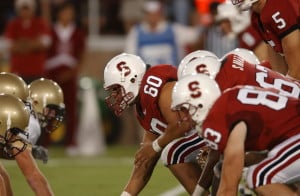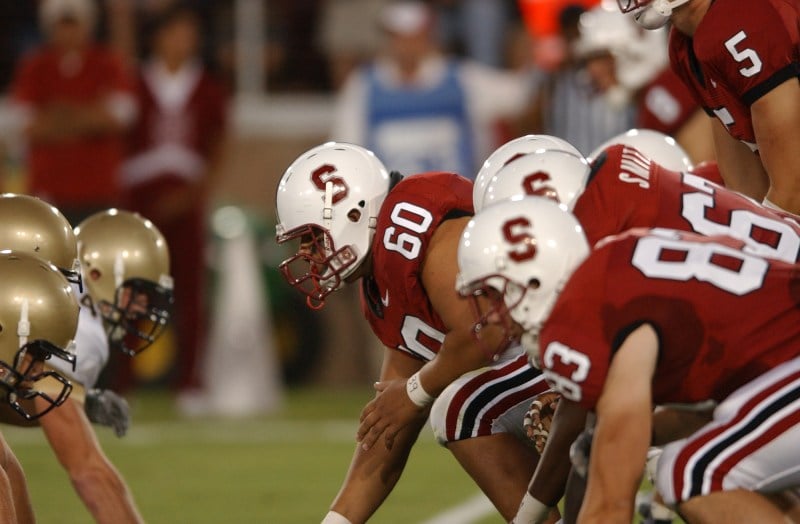The following is an excerpt from The Daily’s upcoming book, “Rags to Roses: The Rise of Stanford Football,” by Joseph Beyda, George Chen and Sam Fisher. The book will be sold electronically starting on July 15, and we will publish excerpts every Friday, including today’s installment on the 2006 season. Scroll down to the bottom of the page to sign up for updates on ordering information and future excerpts.
The most telling moment of the next game, a home loss to Washington State, came not on a run, but on a punt. On the first Stanford possession of the game, with the Cardinal facing a third-and-7 from its own 5-yard line and the game still scoreless, head coach Walt Harris had quarterback Trent Edwards quick kick rather than try to get the first down. The play worked, as Edwards’ punt went for 56 yards and no return, but that didn’t stop the decision from crushing the offense’s morale. The 36-10 loss put Stanford at 0-4 and changed the question from, “Will Stanford make a bowl?” to, “Can this team win a game?”
And that’s when Harris lost the team.

“Walt couldn’t hold the team together,” says junior center Alex Fletcher, “so what he would do is he would make us do bear crawls.”
A bear crawl, done properly, is one of the most grueling conditioning exercises for a football player. Players get down in pushup position and crawl down the length of the field. They aren’t allowed to arch their backs. They aren’t allowed to let their knees touch the ground. And with the massive size of some of the players combined with the unforgiving nature of the artificial turf field, the toll on the players’ bodies was devastating.
As the fans in the crowd wondered if Stanford could win a game, the players on the sideline couldn’t shake their focus off those bear crawls. Every turnover meant 100 yards of bear crawls the next day. Every penalty added 100 more yards. Suddenly, the games didn’t even seem to matter — only the bear crawls did.
“We’d be counting during the game,” offensive lineman Chris Marinelli says. “We’d have like two fumbles, two picks and like a hundred yards of penalties; you’re doing, however many, 1,400 yards of bear crawls.”
“I remember being on the sideline,” tight end Jim Dray says. “Guys were like, ‘Okay, there’s another 100 yards of bear crawls. There’s another 100 yards of bear crawls.’”
The preoccupation with bear crawls wasn’t just limited to time spent on the sidelines. The players in the trenches also couldn’t shake the thought of bear crawls from their minds.
“It got to a point where we were so bad,” Fletcher remembers, “that we were thinking about how you would not do bear crawls. [You wouldn’t] play to win the game; you’d play to not do bear crawls.”
These bear crawls didn’t happen on Monday or Tuesday. They didn’t come after practice in the middle of the week. Harris made the team pay its debt on Sunday, the day after the game.
“Guys on Sunday would be so sore and their hands would be bleeding from the game,” Fletcher says. “We’d be bear crawling, bear crawling, bear crawling. And [Harris] just lost the team.”
And even with five days to recover — if practice can count as recovering — the bear crawls were so difficult that players were still sore for the next week’s game.
“I think [former Athletics Director Ted Leland] had told Walt that things had been pretty lax [under former head coach Buddy Teevens], and he wanted him to bring some accountability,” Dray says. “So I think Walt came in with the mentality that he was really going to be like a drill sergeant and hold us accountable for everything, and I think he went a little too far overboard there.”
It wasn’t just the bear crawls. That punishment may have been the physical manifestation of the tension between the players and their head coach, but Harris’ verbal clashes were sometimes even more demoralizing.
“He always mentioned Stanford guys,” Fletcher says. “He was always mad. ‘Stanford football players always ask why,’ [Harris would complain]. ‘Do it. If I tell you to run through a wall, you do it.’ And he didn’t know how to talk to us, he didn’t know how to motivate us, he didn’t know how to do anything. He thought just by belittling us, Stanford guys would respond to that, and we didn’t respond to that very well at all.”
To learn more about “Rags to Roses,” check out the book’s preface, which was published last week.
